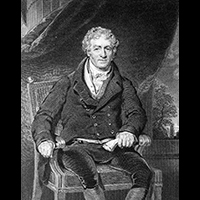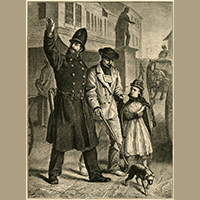
Sir Robert Peel
Sir Robert Peel is known as the father of modern policing. He strongly believed that the police officers of the Metropolitan Police Force should bear no resemblance to members of military forces. Consequently, Peel’s officers (known as bobbies or peelers) were unarmed.
Peel also established nine principles for the Metropolitan Police of London.
- Click on the Forward arrow to continue.

The Nine Peelian Principles
The following are the Peelian Principles (Law Enforcement, n.d.):
- The basic mission for which the police exist is to prevent crime and disorder.
- The ability of the police to perform their duties is dependent upon public approval of police actions.
- Police must secure the willing co-operation of the public in voluntary observance of the law to be able to secure and maintain the respect of the public.
- The degree of co-operation of the public that can be secured diminishes proportionately to the necessity of the use of physical force.
- Police seek and preserve public favor not by pandering to public opinion but by constantly demonstrating absolute impartial service to the law.
- Police use physical force to the extent necessary to secure observance of the law or to restore order only when the exercise of persuasion, advice and warning is found to be insufficient.
- Police, at all times, should maintain a relationship with the public that gives reality to the historic tradition that the police are the public and the public are the police; the police being only members of the public who are paid to give full-time attention to duties which are incumbent on every citizen in the interests of community welfare and existence.
- Police should always direct their action strictly towards their functions and never appear to usurp the powers of the judiciary.
- The test of police efficiency is the absence of crime and disorder not the visible evidence of police action in dealing with it.
- Click on the Forward arrow to continue.

Timelessness
Four of these principles were truly revolutionary and remain a challenge for police officers today. These four principles are as follows (New Westminster Police Department, 2020):
- The degree of co-operation of the public that can be secured diminishes proportionately to the necessity of the use of physical force.
- The ability of the police to perform their duties is dependent upon public approval of police actions.
- Police must secure the willing co-operation of the public in voluntary observance of the law to be able to secure and maintain the respect of the public.
- The test of police efficiency is the absence of crime and disorder, not the visible evidence of police action in dealing with it.
- Click on the Forward arrow to continue.